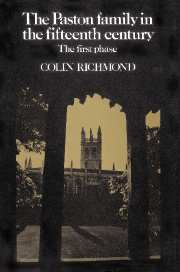Book contents
- Frontmatter
- Contents
- List of genealogical tables
- Preface
- Acknowledgements
- List of abbreviations
- Chronological table
- 1 The origins of the Pastons
- 2 Land: acquisition and defence
- 3 East Beckham
- 4 Three marriages
- 5 Relations: the Garneys and the Berneys
- 6 The deathbed of William Paston and its consequences
- 7 Sir John Fastolf and John Paston
- Conclusion
- Index
7 - Sir John Fastolf and John Paston
Published online by Cambridge University Press: 26 December 2009
- Frontmatter
- Contents
- List of genealogical tables
- Preface
- Acknowledgements
- List of abbreviations
- Chronological table
- 1 The origins of the Pastons
- 2 Land: acquisition and defence
- 3 East Beckham
- 4 Three marriages
- 5 Relations: the Garneys and the Berneys
- 6 The deathbed of William Paston and its consequences
- 7 Sir John Fastolf and John Paston
- Conclusion
- Index
Summary
In the film Chimes at Midnight it is the scenes of those old men, Falstaff and Shallow, remembering their younger days which, even among so many vivid images, remain in the mind. Shakespeare and Orson Welles together are twice as large as life. We are left in no doubt: Shallow's earlier years were as boring as his later ones are tedious. Falstaff, given the occasion to reminisce, undoubtedly would have exaggerated the exploits of his youth just as he did those of his old age. His account of the outing to Gadshill tells us that much. Did Sir John Fastolf employ similar elaborations when he sat with William Worcester in the Winter Hall of Caister beneath the tapestry of the siege of Falaise to tell him of what he did at it and to relate in what terms the Duke of Exeter praised him for his captainship of the Bastille? The Acta Domini Johanni Fastolf would have helped us formulate an answer. It would be a mistake to think that lost work might have been a sober affair. Fastolf could certainly magnify his debts, why not his military achievements? It is surely wrong also to believe that ‘all he cared to remember as he … sank … into the grave were the debts … not paid him’. His old soldier's ‘sense of illusage’ is not in question; the evidence for it is overwhelming. Evidence for the old warrior's assessment of his military past is slighter.
- Type
- Chapter
- Information
- The Paston Family in the Fifteenth Century , pp. 206 - 258Publisher: Cambridge University PressPrint publication year: 1990
- 1
- Cited by



